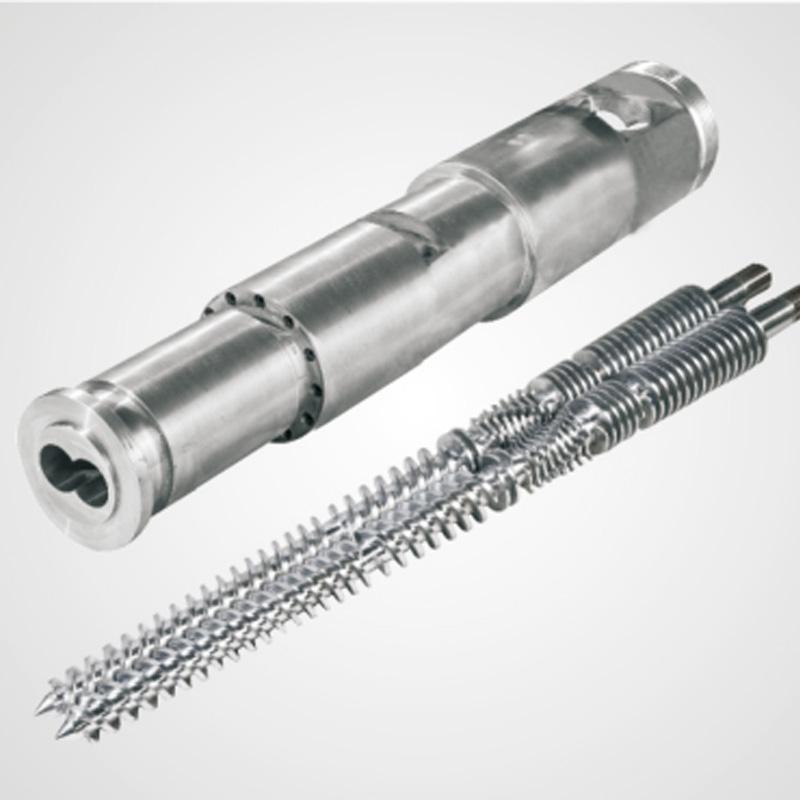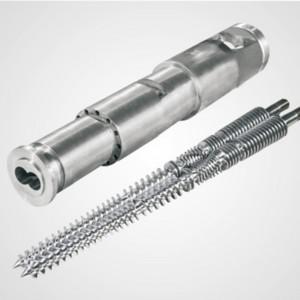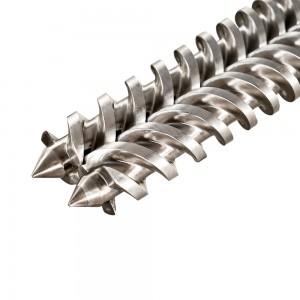
The conical twin screw barrel for SPC floor optimizes material mixing, plasticization, and extrusion. JT’s design ensures consistent product quality. The Pvc Twin Conical Screw Barrel and Conical Twin Screw Barrel And Screw reduce downtime and lower costs. Compared to a Twin Parallel Screw And Barrel, manufacturers see faster production and improved results.
Common SPC Floor Manufacturing Challenges

Manufacturers of SPC flooring face several challenges that impact efficiency and product quality. The production process requires precision at every stage, from raw material preparation to final packaging. The table below highlights some of the most common challenges in the industry:
| Challenge Category | Description |
|---|---|
| Production Process | Complex multi-step process including raw material preparation, extrusion, UV coating, cutting, slotting, quality testing, packaging, and storage. Each step requires precision to ensure product quality and consistency. |
| Market Competition | Fierce competition with many brands, leading to high pressure on pricing and the need for continuous innovation to attract consumers. |
| Price Pressure | Manufacturers face strong price sensitivity from consumers, requiring cost-effective production without compromising quality. |
| Raw Material Costs | Fluctuating and sometimes high costs of key raw materials like stone plastic composites and additives. |
| Manufacturing Technology | Challenges in maintaining and upgrading technology to improve efficiency and product quality. |
| Quality Control | Strict quality testing is essential to detect defects such as bubbles, scratches, and impurities, ensuring product reliability. |
| Consumer Education | Need to increase consumer awareness about SPC flooring benefits, which requires additional resources and marketing efforts. |
Inconsistent Material Mixing
Inconsistent material mixing remains a major concern in SPC floor manufacturing. When the mixing process fails to achieve uniformity, the material ratios can vary. This leads to defects such as unstable product size, uneven surfaces, poor toughness, brittleness, and low impact resistance. Manufacturers must ensure precise raw material formulation and uniform mixing to maintain high product quality and meet strict production standards.
Note: Uniform mixing not only improves the durability of SPC flooring but also reduces the risk of defects that can affect customer satisfaction.
Poor Extrusion Quality
Poor extrusion quality can result in panels with inconsistent thickness, rough surfaces, or visible imperfections. These issues often arise from improper plasticization or unstable processing parameters. Manufacturers need to control temperature, pressure, and screw speed during extrusion to achieve smooth, dimensionally accurate SPC floor panels.
High Energy Consumption
SPC floor production consumes significant energy, especially during the plasticization and extrusion stages. Inefficient equipment or outdated technology can increase energy usage, raising operational costs. Companies seek advanced machinery that optimizes energy use while maintaining high output.
Frequent Downtime
Frequent downtime disrupts production schedules and increases costs. Labor shortages, especially among skilled workers, and high labor costs in regions like the US, add to these challenges. Equipment maintenance, technical issues, and workforce management all contribute to unplanned stoppages, making efficiency improvements essential for manufacturers.
How the Conical Twin Screw Barrel for SPC Floor Solves These Issues

Superior Mixing and Homogenization
The conical twin screw barrel for SPC floor delivers exceptional mixing performance. Its unique geometry and precise engineering allow the screws to blend PVC, stone powder, and additives thoroughly. This process ensures every batch achieves a uniform composition. Manufacturers see fewer defects like uneven surfaces or brittle panels. The advanced design of JT’s barrel creates a consistent material flow, which helps maintain the right ratio of each ingredient.
Note: Uniform mixing leads to higher product quality and reduces the risk of customer complaints.
A look at the technical specifications shows why this barrel excels at mixing:
| Performance Metric | Value / Description |
|---|---|
| Temperature Distribution | More uniform |
| Melting and Extrusion Quality | Improved |
| Screw Surface Roughness (Ra) | 0.4 μm |
| Screw Straightness | 0.015 mm |
These features help the conical twin screw barrel for SPC floor maintain stable processing conditions, which is essential for producing reliable SPC flooring.
Enhanced Extrusion Stability
Extrusion stability is critical in SPC floor manufacturing. The conical twin screw barrel for SPC floor controls temperature and pressure with high precision. This control prevents issues like inconsistent thickness or surface imperfections. The barrel’s four heating zones and 5 kW heating power keep the material at the ideal temperature throughout the process.
Manufacturers benefit from:
- Consistent panel thickness
- Smooth surface finishes
- Fewer production interruptions
The table below highlights key specifications that contribute to extrusion stability:
| Specification | Value |
|---|---|
| Barrel Heating Zones | 4 |
| Barrel Heating Power | 5 kW |
| Screw Cooling Power | 3 kW |
| Nitriding Hardness (HRC) | 58-62 |
These features ensure the conical twin screw barrel for SPC floor produces panels that meet strict quality standards.
Improved Material Flow and Plasticization
Efficient material flow and plasticization are vital for high-quality SPC flooring. The conical twin screw barrel for SPC floor uses a special screw profile and high-grade 38CrMoAlA alloy. This combination allows the barrel to soften and plasticize PVC quickly and evenly. The result is a smooth, malleable material ready for shaping.
Manufacturers notice:
- Faster melting and extrusion of plastics
- Reduced energy consumption
- Lower scrap rates
Tip: Improved plasticization means less waste and more usable product per batch.
The following metrics demonstrate the barrel’s effectiveness:
| Metric | Value / Description |
|---|---|
| Production Efficiency | Greatly improved |
| Energy Consumption | Significant reduction |
| Scrap Rates | Significant reduction |
| Nitriding Depth | 0.5-0.8 mm |
These advantages help manufacturers save on raw materials and energy costs.
Reduced Wear, Maintenance, and Operational Costs
Durability is a key strength of the conical twin screw barrel for SPC floor. JT uses advanced hardening and nitriding treatments to increase surface hardness and reduce brittleness. The barrel’s chromium-plated surface and alloy layer resist wear, even during continuous operation. This durability means less frequent maintenance and fewer production stoppages.
Key benefits include:
- Longer equipment lifespan
- Lower maintenance costs
- Reduced downtime
A summary of the durability features:
| Feature | Value / Description |
|---|---|
| Surface Hardness (HV) | 900-1000 |
| Raw Material Tempering Hardness | ≥280 HB |
| Nitriding Brittleness | ≤ Grade 1 |
| Alloy Layer Hardness | HRC50-65 |
Manufacturers who choose the conical twin screw barrel for SPC floor experience smoother operations and greater cost savings over time.
The conical twin screw barrel for SPC floor helps manufacturers solve mixing, extrusion, and durability challenges. Advanced UV curing technology and cost-efficient production support high-quality results. With a growing market and strong demand for SPC flooring, manufacturers can gain a clear advantage by upgrading to JT’s reliable solution.
FAQ
What makes JT’s conical twin screw barrel suitable for SPC floor production?
JT’s barrel uses high-grade materials and precise engineering. It ensures uniform mixing, stable extrusion, and long-lasting durability for SPC flooring manufacturers.
Tip: Consistent quality reduces waste and increases output.
How does the conical twin screw barrel reduce maintenance costs?
The barrel’s hardened and nitrided surfaces resist wear. This design extends service life and lowers the need for frequent repairs.
Can the conical twin screw barrel fit different extruder models?
JT offers various sizes and models. Manufacturers can select the right barrel to match their specific extruder and production requirements.
Post time: Jun-14-2025
